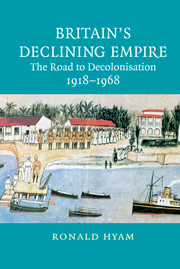Book contents
- Frontmatter
- Contents
- List of illustrations
- Maps
- Preface
- List of abbreviations
- Introduction
- 1 ‘The whole world is rocking’: British governments and a dysfunctional imperial system, 1918–1945
- 2 ‘British imperialism is dead’: the Attlee government and the end of empire, 1945–1951
- 3 ‘Rugged and tangled difficulties’: the Churchill and Eden governments and the end of empire, 1951–1956
- 4 ‘The wind of change is blowing’: the Macmillan and Douglas-Home governments and the end of empire,1957–1964
- 5 'We could no longer afford to honour our pledges': the Wilson government and the end of empire, 1964–1968
- Epilogue
- Appendix
- Select bibliography
- Index
Epilogue
Published online by Cambridge University Press: 05 June 2014
- Frontmatter
- Contents
- List of illustrations
- Maps
- Preface
- List of abbreviations
- Introduction
- 1 ‘The whole world is rocking’: British governments and a dysfunctional imperial system, 1918–1945
- 2 ‘British imperialism is dead’: the Attlee government and the end of empire, 1945–1951
- 3 ‘Rugged and tangled difficulties’: the Churchill and Eden governments and the end of empire, 1951–1956
- 4 ‘The wind of change is blowing’: the Macmillan and Douglas-Home governments and the end of empire,1957–1964
- 5 'We could no longer afford to honour our pledges': the Wilson government and the end of empire, 1964–1968
- Epilogue
- Appendix
- Select bibliography
- Index
Summary
At the actual moment of the transfer of power to a former dependency, the mode of departure often reflected the independence process, whether friendly or not. India on 14–15 August 1947 was the first, and remains the most poignant because of Nehru's mellifluous words:
Long years ago we made a tryst with destiny, and now the time comes when we shall redeem our pledge … At the stroke of the midnight hour, while the world sleeps, India will awake to life and freedom. A moment comes, which comes but rarely in history, when we step out from the old to the new, when an age ends and when the soul of a nation, long suppressed, finds utterance.
Delirious crowds mobbed Mountbatten's vice-regal coach. Nehru scrambled aboard. Some onlookers, nearly crushed beneath its wheels, were pulled up: an Indian woman with infants, the Polish wife of a British officer, an Indian press reporter. Next morning, the crowds unharnessed the horses and dragged the carriage themselves, cheering the British and letting off fireworks. It was just like some huge traditional Hindu mela, or chaotic tamasha (free for all); Khushwant Singh, a journalist, commented in amazement that it was as if ‘this nation had become more pro-British than it had ever been since the British came’. (It was much quieter in Karachi, though.)
Nine months later in Palestine, the atmosphere was grim.
- Type
- Chapter
- Information
- Britain's Declining EmpireThe Road to Decolonisation, 1918–1968, pp. 398 - 410Publisher: Cambridge University PressPrint publication year: 2007



